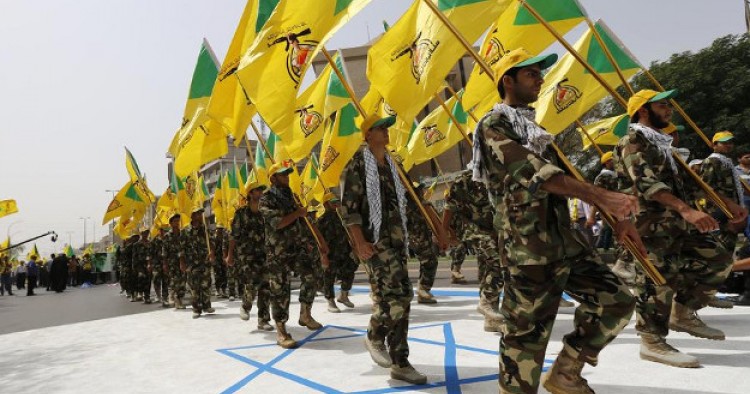A commander of Iranian-backed Iraqi militia group has warned that his forces will target American troops in Iraq if they do not leave the country after the battle against the Islamic State is over, the Iranian media reported. Jafar al-Hussaini, the spokesman for Kata'ib Hezbollah (Hezbollah Brigades), also accused the United States and the leadership of the Iraqi Kurdistan of assisting Islamic State militants to safely withdraw from Tal Afar, an Iraqi city west of Mosul recently liberated from the Islamic State. “Before the Tal Afar operation began, Daesh [Islamic State] members left [Tal Afar] in 11 buses provided by Masoud Barzani and reached al-Eyaziya,” he said. “The leader of Daesh escaped from Tal Afar and al-Eyaziya to the Nineveh Desert with the assistance of Barzani and the Americans,” he further alleged. Al-Hussaini rejected reports that 1,200 Islamic State militants were killed in the Tal Afar operation, adding that the group participated in the offensive and has not seen bodies of these terrorists.
He also described the U.S. military presence in Iraq as the “biggest obstacle” to defeating the Islamic State in the country and called on Prime Minister Haider al-Abadi to pay attention to increasing U.S. influence over decision-making processes in Baghdad.
Comment: Kata'ib Hezbollah, or the Hezbollah Brigades, is an Iranian-sponsored Shiite militia group that operates both in Iraq and Syria. In 2009, the U.S. Departments of Treasury and State designated Kata'ib Hezbollah as a terrorist entity for having “committed, directed, supported, or posed a significant risk of commit acts of violence against Coalition and Iraqi Security Forces.” In the wake of the 2003 Iraqi invasion, the group’s cell members carried out numerous attacks against U.S. forces. According to U.S. officials, the I.R.G.C.’s elite Quds Force funded and trained members of the group jointly with the Lebanese Hezbollah.
With the Islamic State on the verge of collapse in Iraq and losing ground in Syria, Iran’s Revolutionary Guards and its regional proxies see the presence of the U.S. military forces in Iraq and Syria as the biggest threat to their regional ambitions. In Syria, Iran and its allies are pressuring the U.S. to leave the al-Tanf region in the southeast along Syria’s border with Jordan and Iraq. And likewise in Iraq, Tehran has increased pressure on Baghdad not to allow U.S. troops to stay in the country for the long-term.
In the past one year, the U.S. and Iranian-backed forces have been de facto allies in Iraq. The Tal Afar operation was the latest example of the U.S.-led coalition and Iranian-backed groups fighting on the same side. However, as the common foe is ousted from its major Iraqi strongholds, including Mosul and Tal Afar, the I.R.G.C. and its Iraqi proxies have stepped up propaganda against the U.S. and its regional allies – which poses risks to U.S. military advisers helping the Iraqi security forces and also complicating post-conflict governance and reconciliation efforts at local and national levels in Iraq.
Last month, an article in hardline Javan Online, an I.R.G.C. mouthpiece, said the liberation of Tal Afar is a “major defeat for America and terrorists” and paves the way for the expulsion of U.S. Troops from Iraq. “The biggest loser of the Tal Afar operation and this victory is the United States of America,” it added.
As the article in Javan Online indicates, the I.R.G.C.’s primary goal now is to force the United States to withdraw its troops from Iraq. Tehran has made its position clear to Baghdad that it opposes the presence of American troops in Iraq after the battle war against the Islamic State is over. When Iraqi Prime Minister Haider al-Abadi visited Tehran in June, Supreme Leader Ali Khamenei made two key propositions to him: to expel the U.S. forces and not to dissolve the P.M.F. after the Islamic State’s defeat. Iranian-backed P.M.F. groups have also begun to implicitly and explicitly threaten the U.S. forces in Iraq.
On August 1, Qais al-Khazali, the secretary-general of Iraq’s Asaib ahl al-Haq armed group, accused the United States, Israel, Saudi Arabia and Turkey of supporting the Islamic State in Iraq and the broader region. Khazali has pledged allegiance to Iran’s Supreme Leader Ali Khamenei, and his group takes orders from I.R.G.C. Quds Force Commander Qassem Soleimani, rather than the government in Baghdad. Khazali was arrested by the U.S. military in 2007 for his alleged role in high-profile attack in Karbala that had killed five American service members. But he was released two years later along with other AAH members – apparently in an exchange for a British hostage. The U.S. and British government denied it was a prisoner exchange.
The Middle East Institute (MEI) is an independent, non-partisan, non-for-profit, educational organization. It does not engage in advocacy and its scholars’ opinions are their own. MEI welcomes financial donations, but retains sole editorial control over its work and its publications reflect only the authors’ views. For a listing of MEI donors, please click here.












